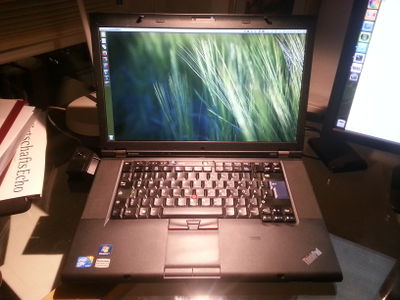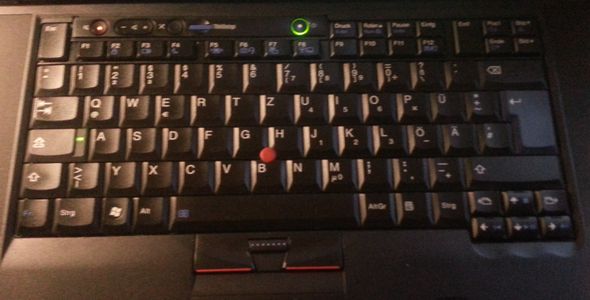Difference between revisions of "Thinkpad W510"
From Blue-IT.org Wiki
(→What I like) |
(→What I like) |
||
| Line 9: | Line 9: | ||
* 4 x 1.6 GHz (up to 2.8 GHz) - 8 Threads. That's more you'll ever need for real work. I mainly do virtualisation, programming, photo and office tasks. | * 4 x 1.6 GHz (up to 2.8 GHz) - 8 Threads. That's more you'll ever need for real work. I mainly do virtualisation, programming, photo and office tasks. | ||
* 16 GB ram (four banks, up to 32GB) | * 16 GB ram (four banks, up to 32GB) | ||
| − | * [Samsung_SSD|500 GB SSD Samsung Evo - see, problems!] | + | * [[#Samsung_SSD|500 GB SSD Samsung Evo - see, problems!]] |
That's it folks. Work, don't play around! | That's it folks. Work, don't play around! | ||
Revision as of 19:57, 5 January 2014
Contents
[hide]What I like
- was fairly pricy
- has the "old" keyboard style
- only nvidia, don't need intel (hybrid graphics)
- no fingerprint
- umts
- webcam
- usb 3.0 (NEC)
- 4 x 1.6 GHz (up to 2.8 GHz) - 8 Threads. That's more you'll ever need for real work. I mainly do virtualisation, programming, photo and office tasks.
- 16 GB ram (four banks, up to 32GB)
- 500 GB SSD Samsung Evo - see, problems!
That's it folks. Work, don't play around!
System with Ubuntu Linux Desktop and Docking.
Hardware
# lspci 00:00.0 Host bridge: Intel Corporation Core Processor DMI (rev 11) 00:03.0 PCI bridge: Intel Corporation Core Processor PCI Express Root Port 1 (rev 11) 00:08.0 System peripheral: Intel Corporation Core Processor System Management Registers (rev 11) 00:08.1 System peripheral: Intel Corporation Core Processor Semaphore and Scratchpad Registers (rev 11) 00:08.2 System peripheral: Intel Corporation Core Processor System Control and Status Registers (rev 11) 00:08.3 System peripheral: Intel Corporation Core Processor Miscellaneous Registers (rev 11) 00:10.0 System peripheral: Intel Corporation Core Processor QPI Link (rev 11) 00:10.1 System peripheral: Intel Corporation Core Processor QPI Routing and Protocol Registers (rev 11) 00:16.0 Communication controller: Intel Corporation 5 Series/3400 Series Chipset HECI Controller (rev 06) 00:19.0 Ethernet controller: Intel Corporation 82577LM Gigabit Network Connection (rev 06) 00:1a.0 USB controller: Intel Corporation 5 Series/3400 Series Chipset USB2 Enhanced Host Controller (rev 06) 00:1b.0 Audio device: Intel Corporation 5 Series/3400 Series Chipset High Definition Audio (rev 06) 00:1c.0 PCI bridge: Intel Corporation 5 Series/3400 Series Chipset PCI Express Root Port 1 (rev 06) 00:1c.1 PCI bridge: Intel Corporation 5 Series/3400 Series Chipset PCI Express Root Port 2 (rev 06) 00:1c.3 PCI bridge: Intel Corporation 5 Series/3400 Series Chipset PCI Express Root Port 4 (rev 06) 00:1c.4 PCI bridge: Intel Corporation 5 Series/3400 Series Chipset PCI Express Root Port 5 (rev 06) 00:1c.6 PCI bridge: Intel Corporation 5 Series/3400 Series Chipset PCI Express Root Port 7 (rev 06) 00:1c.7 PCI bridge: Intel Corporation 5 Series/3400 Series Chipset PCI Express Root Port 8 (rev 06) 00:1d.0 USB controller: Intel Corporation 5 Series/3400 Series Chipset USB2 Enhanced Host Controller (rev 06) 00:1e.0 PCI bridge: Intel Corporation 82801 Mobile PCI Bridge (rev a6) 00:1f.0 ISA bridge: Intel Corporation Mobile 5 Series Chipset LPC Interface Controller (rev 06) 00:1f.2 SATA controller: Intel Corporation 5 Series/3400 Series Chipset 6 port SATA AHCI Controller (rev 06) 00:1f.3 SMBus: Intel Corporation 5 Series/3400 Series Chipset SMBus Controller (rev 06) 01:00.0 VGA compatible controller: NVIDIA Corporation GT216GLM [Quadro FX 880M] (rev a2) 01:00.1 Audio device: NVIDIA Corporation High Definition Audio Controller (rev a1) 03:00.0 Network controller: Intel Corporation Centrino Ultimate-N 6300 (rev 35) 0d:00.0 SD Host controller: Ricoh Co Ltd MMC/SD Host Controller (rev 01) 0d:00.1 System peripheral: Ricoh Co Ltd R5U2xx (R5U230 / R5U231 / R5U241) [Memory Stick Host Controller] (rev 01) 0f:00.0 USB controller: NEC Corporation uPD720200 USB 3.0 Host Controller (rev 03) 17:00.0 SD Host controller: Ricoh Co Ltd MMC/SD Host Controller (rev 01) 17:00.3 FireWire (IEEE 1394): Ricoh Co Ltd R5C832 PCIe IEEE 1394 Controller (rev 01) ff:00.0 Host bridge: Intel Corporation Core Processor QuickPath Architecture Generic Non-Core Registers (rev 04) ff:00.1 Host bridge: Intel Corporation Core Processor QuickPath Architecture System Address Decoder (rev 04) ff:02.0 Host bridge: Intel Corporation Core Processor QPI Link 0 (rev 04) ff:02.1 Host bridge: Intel Corporation Core Processor QPI Physical 0 (rev 04) ff:03.0 Host bridge: Intel Corporation Core Processor Integrated Memory Controller (rev 04) ff:03.1 Host bridge: Intel Corporation Core Processor Integrated Memory Controller Target Address Decoder (rev 04) ff:03.4 Host bridge: Intel Corporation Core Processor Integrated Memory Controller Test Registers (rev 04) ff:04.0 Host bridge: Intel Corporation Core Processor Integrated Memory Controller Channel 0 Control Registers (rev 04) ff:04.1 Host bridge: Intel Corporation Core Processor Integrated Memory Controller Channel 0 Address Registers (rev 04) ff:04.2 Host bridge: Intel Corporation Core Processor Integrated Memory Controller Channel 0 Rank Registers (rev 04) ff:04.3 Host bridge: Intel Corporation Core Processor Integrated Memory Controller Channel 0 Thermal Control Registers (rev 04) ff:05.0 Host bridge: Intel Corporation Core Processor Integrated Memory Controller Channel 1 Control Registers (rev 04) ff:05.1 Host bridge: Intel Corporation Core Processor Integrated Memory Controller Channel 1 Address Registers (rev 04) ff:05.2 Host bridge: Intel Corporation Core Processor Integrated Memory Controller Channel 1 Rank Registers (rev 04) ff:05.3 Host bridge: Intel Corporation Core Processor Integrated Memory Controller Channel 1 Thermal Control Registers (rev 04)
# lsusb Bus 002 Device 017: ID 05c6:9205 Qualcomm, Inc. Bus 002 Device 002: ID 8087:0020 Intel Corp. Integrated Rate Matching Hub Bus 002 Device 001: ID 1d6b:0002 Linux Foundation 2.0 root hub Bus 004 Device 001: ID 1d6b:0003 Linux Foundation 3.0 root hub Bus 003 Device 001: ID 1d6b:0002 Linux Foundation 2.0 root hub Bus 001 Device 003: ID 17ef:480f Lenovo Integrated Webcam [R5U877] Bus 001 Device 016: ID 17ef:100a Lenovo ThinkPad Mini Dock Plus Series 3 Bus 001 Device 005: ID 0a12:0001 Cambridge Silicon Radio, Ltd Bluetooth Dongle (HCI mode) Bus 001 Device 002: ID 8087:0020 Intel Corp. Integrated Rate Matching Hub Bus 001 Device 001: ID 1d6b:0002 Linux Foundation 2.0 root hub
Operation System
- Working on Ubuntu 12.04 LTS
- Updated to Ubuntu 13.10
Nvidia Quadro FX
VDPAU
sudo apt-get install livdpau-va-driver bvdpau-va-gl1 vainfo
For flashplayer:
sudo mkdir /etc/adobe/ && sudo bash -c "echo 'EnableLinuxHWVideoDecode=1' >> /etc/adobe/mms.cfg"
X11
Problems with brightness-control with the nvidia card.
vim /etc/X11/xorg.conf
Section "Device"
Identifier "DefaultDevice"
Option "NoLogo" "True"
Option "RegistryDwords" "EnableBrightnessControl=1"
EndSection
Troubleshooting
Samsung SSD
I had real trouble with this:
So I did added some boot params and as time of writing a did not have any freezes any more. (--Apos (talk) 20:40, 5 January 2014 (CET))
sudo vim /etc/default/grub
[...] GRUB_CMDLINE_LINUX_DEFAULT="quiet splash libata.force=1:3.0G,2:1,5G libata.force=noncq" [...]
Power supply not enough - use standard 135 W
Due to the components that rely on a lot of power in this laptop, an original 135 W power supply is needed! Do not use a power supply from another manufacture (no name). You will not succeed!
If you don't do this, the laptop components do not run at full speed!
Solution: None! Use the 135W power supply or run at battery power.
Ultrabay
Eject the ultrabay
http://www.thinkwiki.org/wiki/How_to_hotswap_Ultrabay_devices#Script_for_Ultrabay_eject
Create this script and run it as root!
Don't forget to alter the DEVICEPATH path at the beginning of the scrip according to your machine!.
udevadm info --query=path --name=/dev/sr0 | perl -pe 's!/block/...$!!'
Make the button for the DVD drive less sensitive
The problem is caused by udev
sudo cp /lib/udev/rules.d/60-cdrom_id.rules /etc/udev/rules.d/.
Uncomment the containing ENV{DISK_EJECT_REQUEST}
sudo vim /etc/udev/rules.d/60-cdrom_id.rules
# media eject button pressed
#ENV{DISK_EJECT_REQUEST}=="?*", RUN+="cdrom_id --eject-media $devnode", GOTO="cdrom_end"
Restart udev
sudo service udev force-reload sudo service udev restart
You should emediately see, that the button.
Lock the device button
Lock:
eject -i on /dev/sr0
Unlock:
eject -i off /dev/sr0
Toggle script:
#!/bin/bash
DEVICE="/dev/sr0"
if eject "${DEVICE}"
then
eject -i on "${DEVICE}"
else
eject -i off "${DEVICE}"
fi
Put this into startup:
#!/bin/bash
DEVICE="/dev/sr0"
eject -i on "${DEVICE}"

